The mobile app industry has been experiencing extraordinary growth in recent years. By 2025, the global market is expected to generate over $693 billion, with mobile apps increasingly driving e-commerce, contributing to more than 40% of total online sales. As smartphones become indispensable tools in our daily lives, with users spending more than 4 hours a day on apps, businesses are keen to capitalize on this trend by developing their own mobile solutions.
However, businesses face significant challenges when hiring mobile app developers. The demand for skilled developers is high, and with the rapid evolution of technologies like AI, AR, and IoT, finding developers with the right expertise can be daunting. Furthermore, businesses must navigate issues related to cost, time-to-market, and project scope to ensure they’re hiring the right talent for their specific needs.
In this blog, we will break down the essential steps to hire mobile app developers, ensuring you make informed decisions and secure the expertise necessary to bring your app idea to life.
Advantages of Partnering with an App Development Company
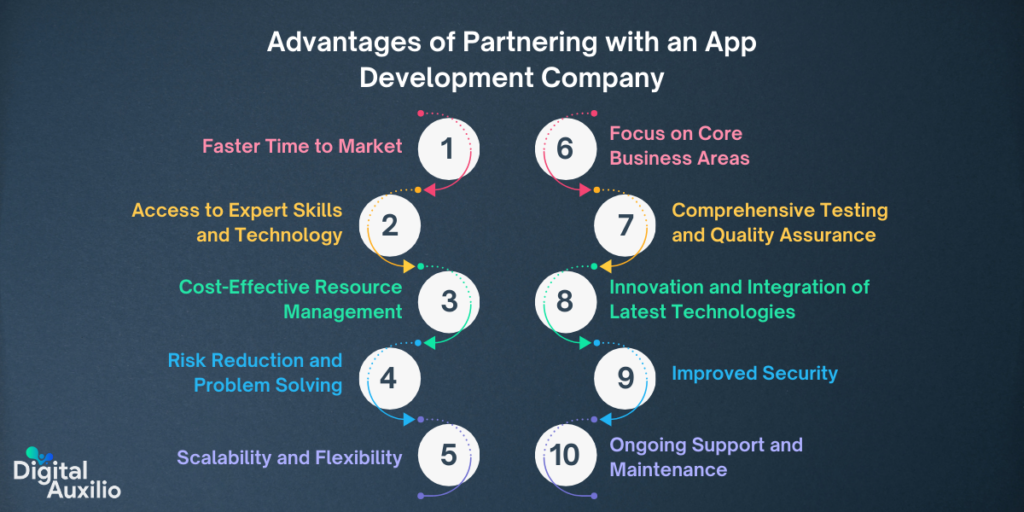
Partnering with a professional app development company can significantly enhance your business’s ability to create innovative and high-performing mobile applications. By leveraging the expertise and resources of an experienced development partner, businesses can unlock numerous benefits that streamline the development process and ensure long-term success.
Here are the key advantages of collaborating with an app development company:
1. Faster Time to Market
App development companies are equipped with efficient workflows and experienced teams that enable them to deliver products quickly. With streamlined processes and well-established practices, they can expedite development cycles, allowing your app to hit the market faster. This speed is crucial for businesses that need to capitalize on trends or outpace competitors.
2. Access to Expert Skills and Technology
App development companies specialize in building mobile applications, meaning they bring a vast amount of knowledge to your project. From front-end design to back-end coding, they use the latest technologies, frameworks, and tools to ensure your app is cutting-edge. Their specialized expertise guarantees that your app is developed with the best practices, leading to improved functionality and user experience.
3. Cost-Effective Resource Management
Hiring and maintaining an internal development team can be expensive and time-consuming. With an app development company, you gain access to a full team of experts without the overhead costs. This approach saves you from recruiting, training, and managing staff while allowing you to focus your resources on growing other aspects of your business.
4. Risk Reduction and Problem Solving
An experienced app development company is familiar with common challenges and potential roadblocks in mobile app creation. Their background in solving complex technical issues helps them identify risks early and develop strategies to avoid them. With their expertise, you can be confident that your app will be delivered smoothly and without major setbacks.
5. Scalability and Flexibility
As your app grows in popularity, scalability becomes a critical factor. App development companies design apps with future growth in mind. They can easily scale your app’s infrastructure to handle increasing traffic, new features, or expansion into different markets. This adaptability ensures that your app remains robust, even as your user base and business needs evolve.
6. Focus on Core Business Areas
By outsourcing the app development process, you free up time and resources to focus on your core competencies such as marketing, customer engagement, and strategic growth. The app development company handles the technical details, allowing your team to concentrate on expanding your business and serving your customers.
7. Comprehensive Testing and Quality Assurance
To ensure a flawless app, app development companies rigorously test the app on multiple devices and platforms. Their comprehensive testing procedures cover functionality, usability, and security, ensuring that your app performs flawlessly. This dedication to quality leads to a seamless user experience and minimizes the chances of post-launch bugs or issues.
8. Innovation and Integration of Latest Technologies
App development companies are always on the lookout for emerging trends and technologies. By partnering with them, you gain access to cutting-edge tools like artificial intelligence, augmented reality, and machine learning. These technologies can elevate your app’s functionality, making it more engaging and user-friendly.
9. Improved Security
Security is one of the top concerns when developing a mobile app. Partnering with an experienced app development company ensures that your app follows best security practices, protecting user data and preventing vulnerabilities. With their knowledge of security protocols, they can implement features like data encryption, secure APIs, and regular security updates, reducing the risk of cyber threats.
10. Ongoing Support and Maintenance
A successful app doesn’t end with its launch. App development companies offer ongoing support and maintenance services to ensure your app stays up-to-date, secure, and free of bugs. Whether it’s releasing new updates, troubleshooting issues, or ensuring compliance with the latest platform guidelines, they provide continuous support to keep your app running smoothly.
How to Hire an App Developer: Common Options to Consider
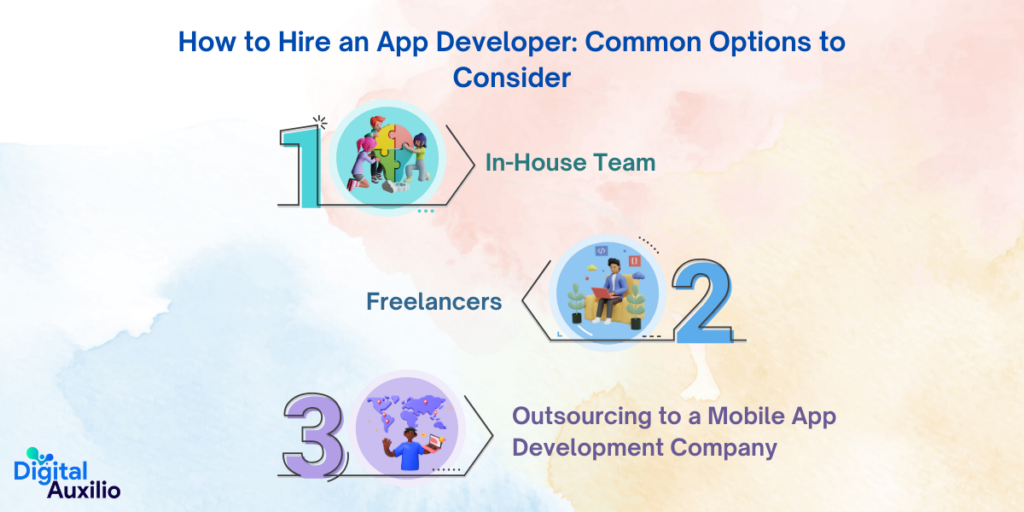
When it comes to hiring an app developer, businesses have three primary options: in-house teams, freelancers, and outsourcing to development companies. Each option has distinct advantages and drawbacks that can impact the success, cost, and overall experience of your mobile app development project. Let’s break down each of these options to help you choose the best fit for your needs.
1. In-House Team
Hiring an in-house team is a traditional approach where you bring on developers to work within your company. This offers several benefits, including full control over the development process, direct communication with the team, and better collaboration. However, it also comes with significant challenges.
Pros:
- Full control over the development process.
- Immediate access to developers for any changes or iterations.
- Better team cohesion and alignment with company culture.
Cons:
- Building an in-house team can be time-consuming and costly.
- Requires investment in recruitment, training, office space, and benefits like medical insurance.
- In-house teams are fixed in size and less flexible.
This option can work well for businesses with large, long-term projects and the resources to manage recruitment and maintenance costs. But for many companies, the expenses and complexities involved in managing an in-house team can be prohibitive.
2. Freelancers
With the rise of freelancing platforms like Upwork and Fiverr, hiring freelance app developers has become a popular option. Freelancers can be a cost-effective solution, especially for startups or businesses with a limited budget.
Pros:
- Cost-effective, as you only pay for the work done.
- Access to a wide range of talent from around the world.
- Flexibility to hire for specific tasks or project needs.
Cons:
- Freelancers may not have the expertise required for larger or more complex projects.
- Communication can sometimes be inconsistent, especially if working across time zones.
- Risk of delays or underperformance due to lack of accountability or commitment.
While freelancers can be a great choice for smaller projects, or when you need specialized expertise for a specific aspect of your app, they may not be suitable for larger, more intricate app development tasks.
3. Outsourcing to a Mobile App Development Company
Outsourcing to a mobile app development company has become one of the most efficient and scalable options for app development. This involves partnering with a company that has a dedicated team of professionals experienced in app development.
Pros:
- Access to a team of skilled developers, designers, and project managers.
- More affordable than building an in-house team, without the hassle of recruitment or infrastructure costs.
- Scalable and flexible, allowing you to adjust the team size as needed.
- Ensures timely delivery of high-quality apps with professional expertise.
Cons:
- Less direct control compared to an in-house team.
- Communication can sometimes be more challenging, especially with offshore teams.
- Potential for misalignment with company culture and values.
Outsourcing is ideal for businesses that want to avoid the overhead costs and complexities of managing an in-house team. It suits companies looking to scale quickly, stay within budget, and ensure the app is built with the latest technologies.
How to Hire Mobile App Developers for Your Project?
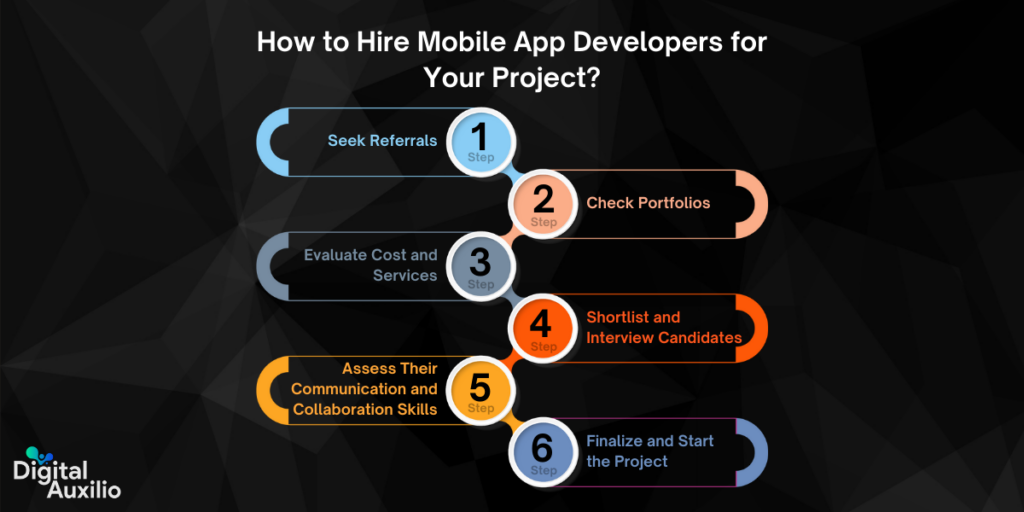
With mobile apps becoming integral to business success, finding the right app developers is essential yet challenging. To help you navigate this process, here’s a detailed step-by-step guide on how to hire mobile app developers who align with your project needs.
Step 1: Seek Referrals
Start by asking friends, family, colleagues, or other trusted contacts for referrals. Word-of-mouth recommendations are often the quickest and most reliable way to find skilled app developers. If personal connections fall short, explore online platforms like Clutch, Mobile App Daily, and GoodFirms, which list verified and top-rated app development companies worldwide. These platforms offer detailed insights into company credibility and expertise.
Step 2: Check Portfolios
Reviewing a company’s portfolio is one of the most critical steps in hiring. It gives you a clear idea of:
- The types of projects they’ve handled.
- Their expertise in delivering solutions across various industries.
- The complexity and creativity they bring to their work.
Firms that proactively share portfolios demonstrate transparency and confidence in their capabilities, making them strong candidates for your project.
Step 3: Evaluate Cost and Services
Mobile app development involves multiple aspects, including design, development, testing, and post-launch support. Not all companies provide end-to-end solutions, so it’s important to:
- Clarify what services are included in the quoted cost.
- Discuss how adding new features might impact the budget.
- Ensure that any additional services (e.g., app maintenance or updates) are documented in the agreement.
Transparency in pricing helps avoid unpleasant surprises later.
Step 4: Shortlist and Interview Candidates
After narrowing down your options, schedule interviews to delve deeper into their approach and expertise. Prepare a mobile app development questionnaire tailored to your project needs.
Here are 10 must-ask questions to consider:
1. Can You Provide Client References?
Speaking with a company’s past clients is an effective way to gauge their reliability and expertise. Ask for references to understand their experience. If the company hesitates, treat it as a red flag and consider other options.
2. What Development Process Do You Follow?
The app development process determines the timeline, cost, and success of your project. Ask whether they use Agile, Waterfall, or another methodology that offers flexibility and faster issue resolution.
3. What is the Experience and Size of Your Team?
Understanding the team’s experience, size, and expertise is crucial. Ask about the professionals who will work on your project, the tech stack they’ll use, and whether they have the skills to meet your requirements.
4. How Do You Approach UI/UX Design?
UI/UX design impacts app performance and user satisfaction. Ask about the company’s design approach and how they balance current industry trends with user expectations to create engaging interfaces.
5. What Post-Launch Services Do You Offer?
App development is just the beginning; maintenance is key to long-term success. Enquire whether the company offers services like app updates, bug resolution, and performance monitoring after the app is launched.
6. What Communication Methods Do You Use?
Clear communication is vital, especially when working with companies in different time zones. Ask if they provide 24/7 support or use tools like AI-powered chatbots to ensure seamless communication throughout the project.
7. Do You Provide Full Code Ownership?
Ensure the agency hands over complete code ownership after the project ends. Lack of ownership can leave you dependent on the agency for future updates and changes.
8. Can You Accommodate Changes in the Scope of Work?
Flexibility is essential in app development. Ask if the company allows room for changes or modifications to the project plan, even after the Scope of Work (SOW) is finalized.
9. Do You Offer Wireframe Development Services?
Wireframes help visualize the app’s user flow and functionality. Not all companies offer this service, so confirm if wireframe development is part of their process.
10. What Are Your Exit Options in the SLA?
Unexpected challenges might lead to terminating the partnership before project completion. Review the company’s Service Level Agreement (SLA) to ensure it includes clear exit options, protecting you from potential disputes.
Step 5: Assess Their Communication and Collaboration Skills
Successful app development hinges on seamless communication and collaboration. Ensure the developers are responsive, open to feedback, and capable of understanding your vision. A company’s ability to align with your goals will significantly impact the project’s success.
Step 6: Finalize and Start the Project
After selecting the best candidate, formalize the agreement by clearly outlining:
- Project scope and milestones.
- Development timeline.
- Payment terms and conditions.
- Ownership rights and intellectual property agreements.
Once everything is in place, initiate the development process and establish regular check-ins to ensure the project stays on track.
How Much Does It Cost to Hire Mobile App Developers?
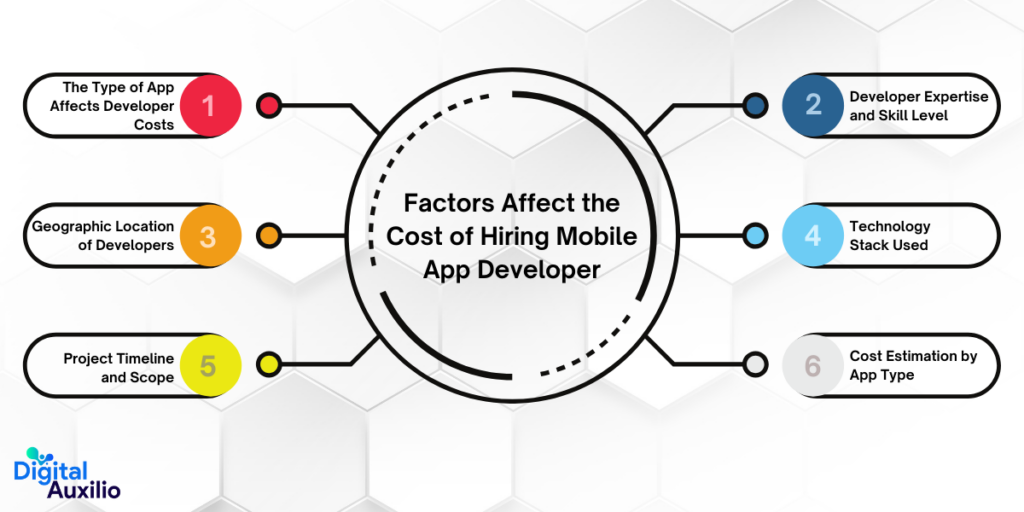
Hiring mobile app developers involves many factors that influence the final cost, just as building the app itself does. The cost to hire mobile app developers varies depending on your project’s specific needs, complexity, and scale. Below is a breakdown of what determines the cost of hiring mobile app developers and what you should consider.
1. The Type of App Affects Developer Costs
Different apps require different skills, technologies, and development time, which impact hiring costs:
- Gaming Apps: Require specialized skills in technologies like Metaverse, 3D modeling, and advanced graphics.
- Finance Apps: Demand expertise in data security, compliance, and API integration.
- eCommerce Apps: Need developers with experience in payment gateways, product catalogs, and user-friendly interfaces.
- Healthcare Apps: Require knowledge of HIPAA compliance and medical data management.
- Entertainment Apps: Often need multimedia processing and streaming capabilities.
Apps with simple functionality will generally require fewer resources, making hiring less costly. Complex apps with advanced features or cutting-edge tech stacks will significantly increase costs.
2. Developer Expertise and Skill Level
- Junior Developers: Cost less but may require more time and supervision.
- Mid-Level Developers: Provide a balance of experience and cost-effectiveness.
- Senior Developers: Charge premium rates but deliver high-quality results faster.
Hourly rates vary based on the developer’s skill level, ranging from $20–$150/hour.
3. Geographic Location of Developers
Location plays a significant role in determining costs:
- North America: $100–$200/hour (highest rates).
- Western Europe: $50–$100/hour.
- Eastern Europe: $30–$50/hour.
- Asia: $20–$40/hour (more affordable options).
While developers in high-cost regions charge more, they may offer better communication and closer time zone alignment.
4. Technology Stack Used
The tech stack your app requires influences hiring costs:
- Developers with expertise in advanced tech (like AI, blockchain, or AR/VR) charge higher rates.
- Standard technologies like React Native, Flutter, or Swift are more budget-friendly.
5. Project Timeline and Scope
- Short Deadlines: This may require more developers or overtime work, increasing costs.
- Long-Term Projects: Offer more flexibility but involve extended engagement and higher total costs.
6. Cost Estimation by App Type
Here’s an approximate breakdown of hiring costs based on app complexity:
- Basic Apps: $15,000–$50,000
- Medium Complexity Apps: $50,000–$150,000
- High Complexity Apps: $150,000–$300,000+
Why Digital Auxilio is the Best Place for Hiring Skilled App Developers?
Hiring the right mobile app developers is a crucial step toward turning your vision into a functional and successful app. With numerous options available, it’s essential to partner with a team that combines expertise, innovation, and proven experience. Digital Auxilio exemplifies these qualities, making it a trusted choice for businesses worldwide.
From startups to established enterprises, the right app development company can significantly impact your project’s success by delivering cutting-edge solutions tailored to your needs. Whether building an app from scratch or scaling an existing one, choosing a skilled and experienced development team ensures your project not only meets expectations but surpasses them.
FAQs
Why should I hire a mobile app development company for my business?
Hiring a mobile app development company ensures you get professional expertise, industry experience, and a polished final product. They have the technical skills, tools, and resources to create an app that aligns with your business goals. Furthermore, a reputable company offers ongoing support, maintenance, and updates, helping you stay competitive in a fast-evolving tech landscape.
How to hire a mobile app developer?
To hire a mobile app developer, follow these steps:Define your requirements: Be clear about the app’s functionality, platforms (iOS/Android), and features.Check expertise: Look for developers with experience in your industry or with similar mobile app types.Review portfolios: Check their previous work and client reviews.Ask about their development process: Ensure they follow best practices and offer a transparent process.Discuss timelines and budgets: Align on expected delivery dates and pricing models.Check communication skills: Ensure they understand your vision and are responsive.
How long does it take to develop a mobile app?
The time it takes to develop a mobile app can vary greatly depending on the complexity of the app, the number of features, and the platforms being developed for. On average:Simple apps: 2–4 monthsModerate complexity apps: 4–6 monthsComplex apps: 6–12 months or more It’s essential to work with the development team to set realistic timelines based on your specific project needs.
How do I find a mobile app developer for my startup?
To find a mobile app developer for your startup:Use online platforms: Websites like Upwork, Toptal, and Clutch help you find experienced developers.Ask for recommendations: Reach out to your network, industry groups, or social media channels.Check tech communities: Explore forums, coding boot camps, and tech meetups where developers actively participate.Consult app development agencies: Agencies have a pool of experienced developers and can offer a range of services. Be sure to review their portfolio and client feedback.

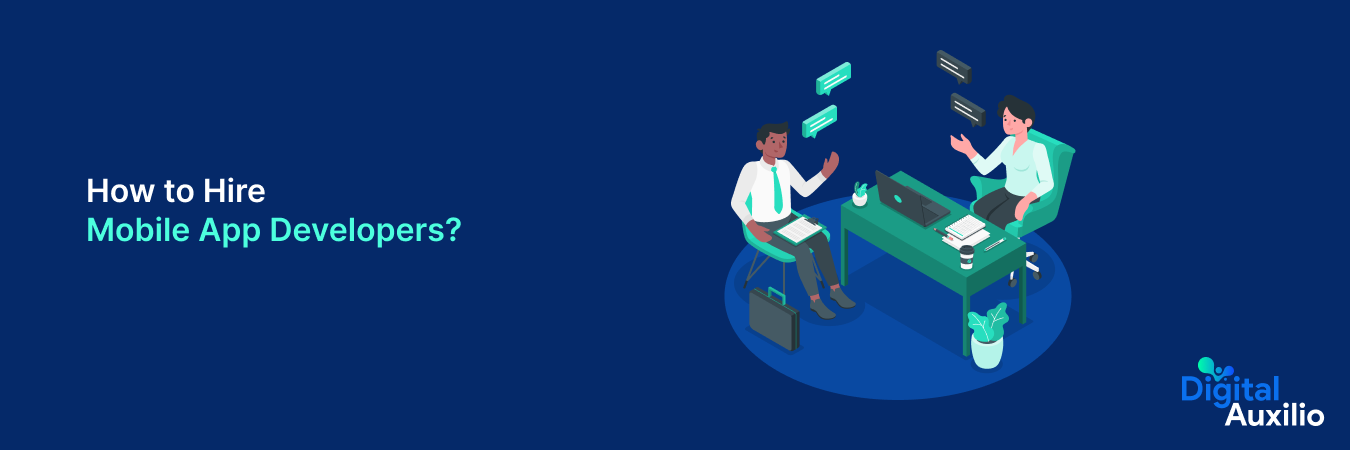
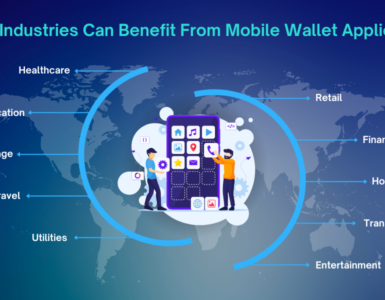






Add comment